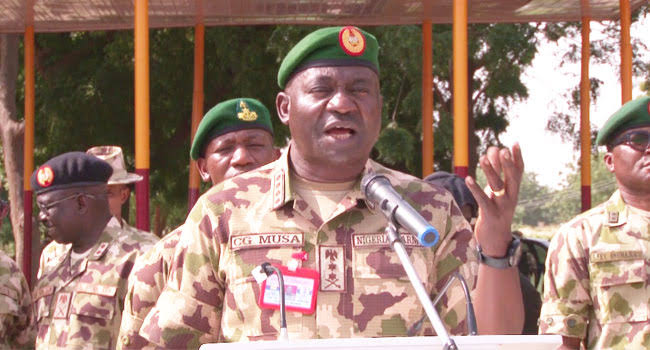Chief of Defence Staff Christopher Musa expressed concern about Finland allegedly supporting separatist leader Simon Ekpa, a key figure in the proscribed Indigenous People of Biafra (IPOB) group.
Musa, during a House of Representatives debate, called for diplomatic action and summoned the Finnish Ambassador to Nigeria to clarify their government’s stance.
He accused Ekpa, residing in Finland, of causing havoc in the South-east through sit-at-home orders, leading to violence.
Musa highlighted the February meeting where Nigeria’s former Foreign Affairs Minister expressed displeasure to the Finnish Ambassador over Ekpa’s threats.
Despite Ekpa’s brief arrest in Finland related to a money collection offense, Musa insisted on addressing the diplomatic encouragement.
Furthermore, Musa criticized the judiciary’s role in contributing to the country’s insecurity.
He lamented the judiciary’s failure to dispense justice promptly, citing instances where military-captured Boko Haram elements faced delays in prosecution.
Despite keeping suspects for extended periods, Musa emphasized the armed forces’ inability to prosecute due to perceived hindrances within the judicial system.
This testimonial highlights the intricate array of challenges that Nigeria is grappling with in its concerted efforts to tackle security threats.
The multifaceted nature of these challenges spans the realms of diplomatic relations and internal legal processes, revealing a complex web of issues that demand a comprehensive and nuanced approach.
Within the sphere of diplomatic relations, Nigeria faces the intricate task of navigating international dynamics and fostering cooperative efforts with other nations to effectively address security concerns.
Simultaneously, the internal legal processes within the country add another layer of complexity, necessitating a thorough examination of domestic legal frameworks and their alignment with international standards.
The intersection of these challenges underscores the need for a holistic strategy that not only considers external relations but also delves into the intricacies of domestic governance.
Addressing security threats requires a delicate balance between safeguarding national interests on the global stage and fortifying the legal and institutional foundations within the country.
This intricate dance of diplomacy and internal legal mechanisms underscores the depth of the issues at hand and emphasizes the importance of a synchronized and well-coordinated approach.
Furthermore, the testimonial draws attention to the dynamic nature of security threats, which evolve and manifest in diverse ways.
This dynamic landscape necessitates a continuous evaluation and adaptation of strategies to effectively counter emerging challenges.
The complexities highlighted in the testimonial emphasize the need for a sustained commitment to strengthening both the external and internal facets of Nigeria’s security apparatus.
In essence, the challenges facing Nigeria in addressing security threats transcend mere surface-level issues.
They demand an exhaustive exploration of diplomatic intricacies and a meticulous examination of internal legal frameworks, reflecting the multifaceted nature of contemporary security concerns.
This testimonial serves as a poignant reminder of the intricate tapestry that governments must navigate in their pursuit of comprehensive and effective security strategies.



